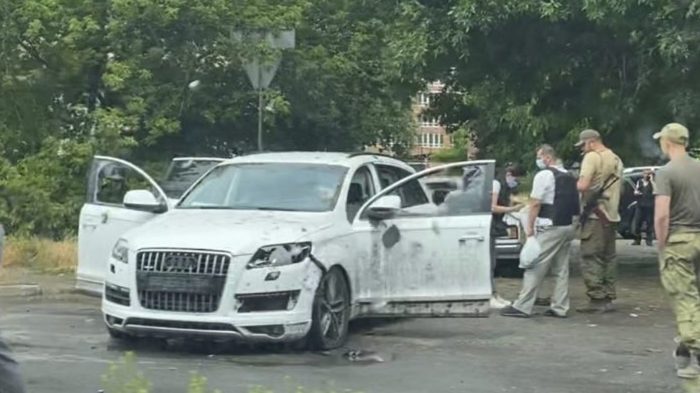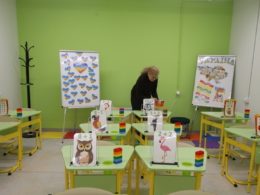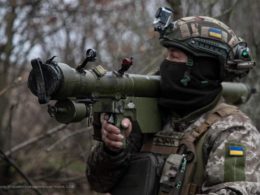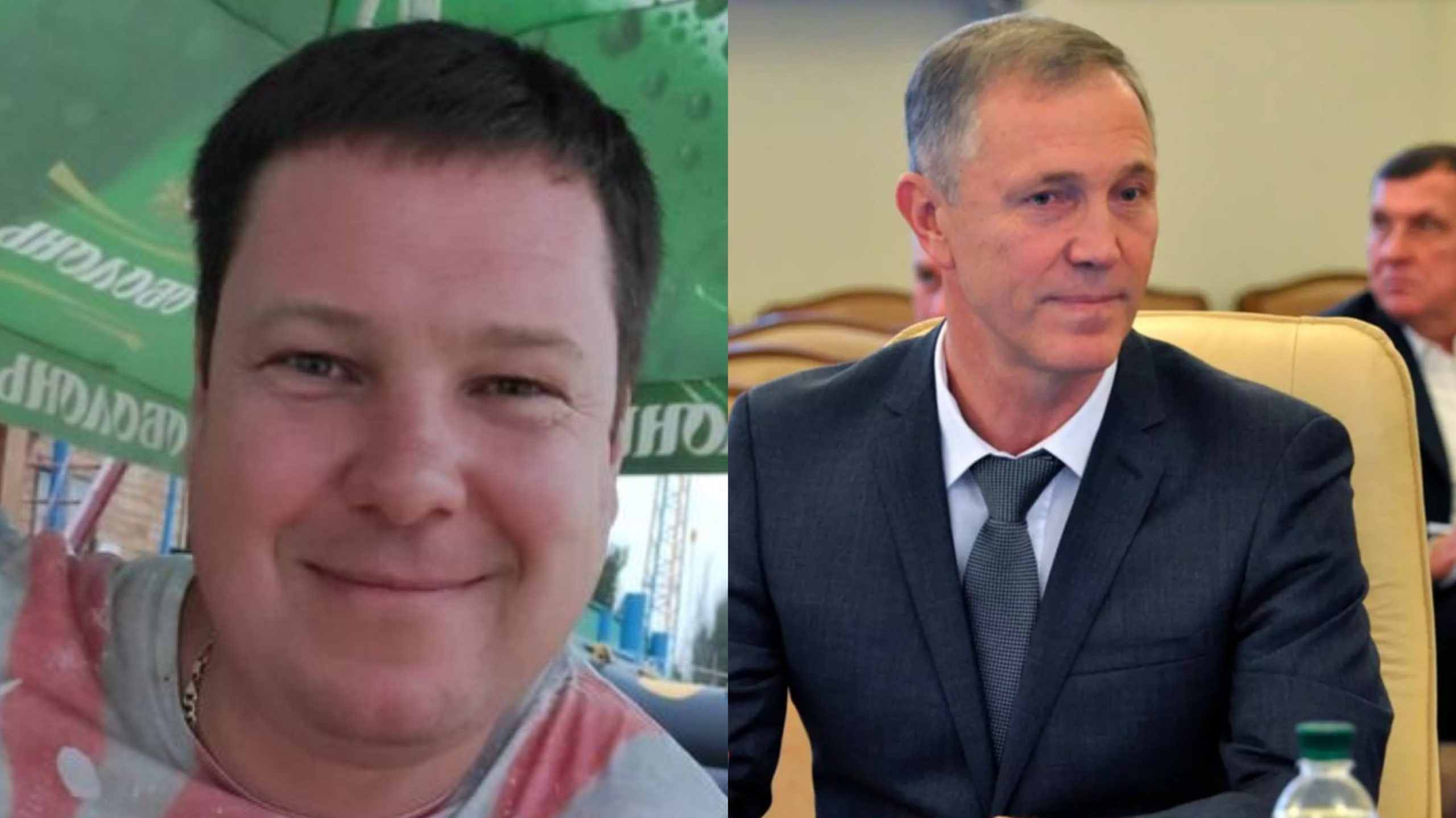Russia continues telling its citizens that it came to liberate Ukraine from the yoke of "Nazis," yet the regime they establish in the Ukrainian territories they occupied could dwarf the likes of Nazi Germany in WWII. Pro-Ukrainian citizens routinely face imprisonment, deportation, torture, and even death. Reports of stolen Ukrainian grain being taken to Russia or exported through ports of occupied Crimea started surfacing in April, and on 30 May, the region’s quisling governor admitted that Russia is indeed stealing Ukrainian grain from last year’s stocks.
In the first days of the occupation in March, Russian troops faced fierce resistance in Kherson and other Ukrainian regions as locals took to the streets to protest. Eventually, the demonstrations dwindled under the use of intimidation and violence, but the resistance didn’t vanish – it went underground. Now, Russian forces are facing a movement resisting occupation rule. Let's see what ordinary people and Ukrainian defenders do to battle Russian soldiers and the occupation administration in Kherson Oblast.
Kherson partisans: bitcoins for heads for invaders and collaborators
Here are some moments of resistance offered by news reports.
Russia believed Ukrainians would meet its military with flowers and smiles. However, in reality, members of the Russian administration in Kherson Oblast require armored vehicles to drive through the occupied cities. They are afraid for their lives and move only in bulletproof vests while being accompanied by guards, Ukraine’s Operational Command South reports.
Russian troops constantly shut down internet access and mobile networks in the Kherson Oblast. However, social media groups for locals offer clear instructions on reconnection. Residents share information on networks which keeps them in touch with friends and relatives.
The majority of Kherson teachers refused to switch to the Russian teaching system and take part in so-called "retraining" in Crimea, Deputy Director of the Center for Middle East Studies Sergei Danilov reports.
Locals also ignore Russian propaganda events: hardly anybody showed up at the pompous “Russia day” celebrations in Kherson.
Recently Kirill Stremousov, deputy head of the occupation administration of the Kherson Oblast, sent an appeal to Russia with a proposal to locate a military base in the region and annex the region without even holding a public referendum. Kherson partisans responded to the statements with UAH 500,000 (almost $17,000) reward for his head written on posters that were plastered all over the city.
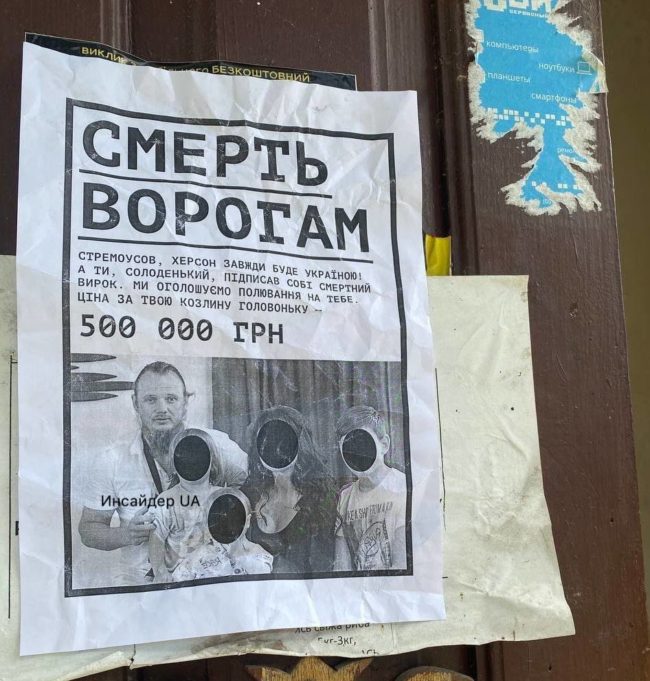
One of the most trusted social media groups of Kherson informs that even though Russia tries to compel residents to accept its passports and put propaganda posters in the city, Ukrainian resistance has been replacing them with its own leaflets reminding about criminal responsibility for treason: “According to the law of Ukraine, obtaining a Russian passport is equated to the treason of the state and will be punished in accordance with the Criminal Code.”
Ukraine’s intelligence reveals residents of the Kherson Oblast are being offered up to 10,000 rubles for receiving Russian citizenship and backing an illegal referendum, but there is still no support among Ukrainians, the Center for National Resistance says.
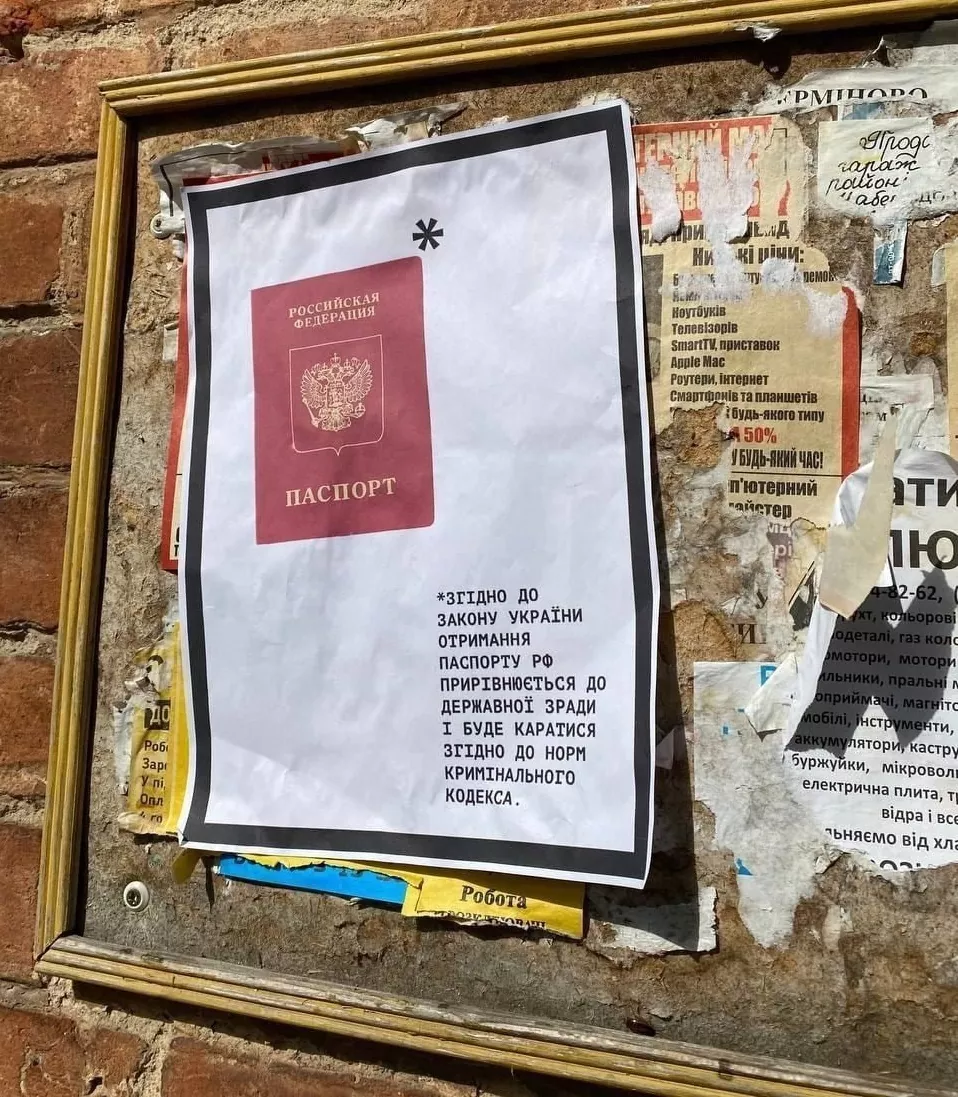
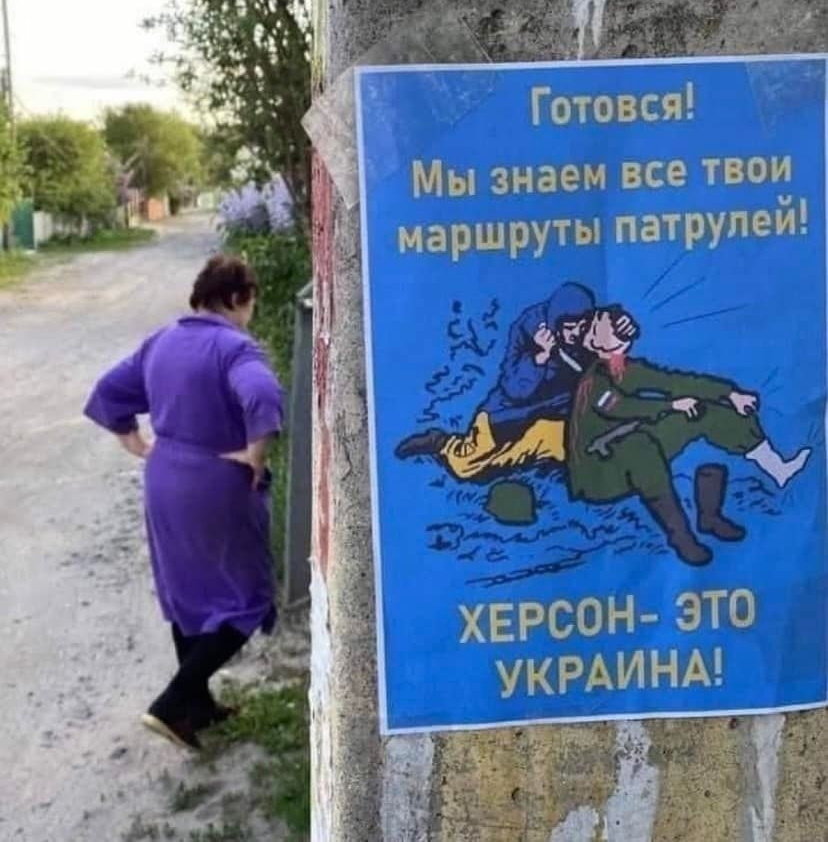
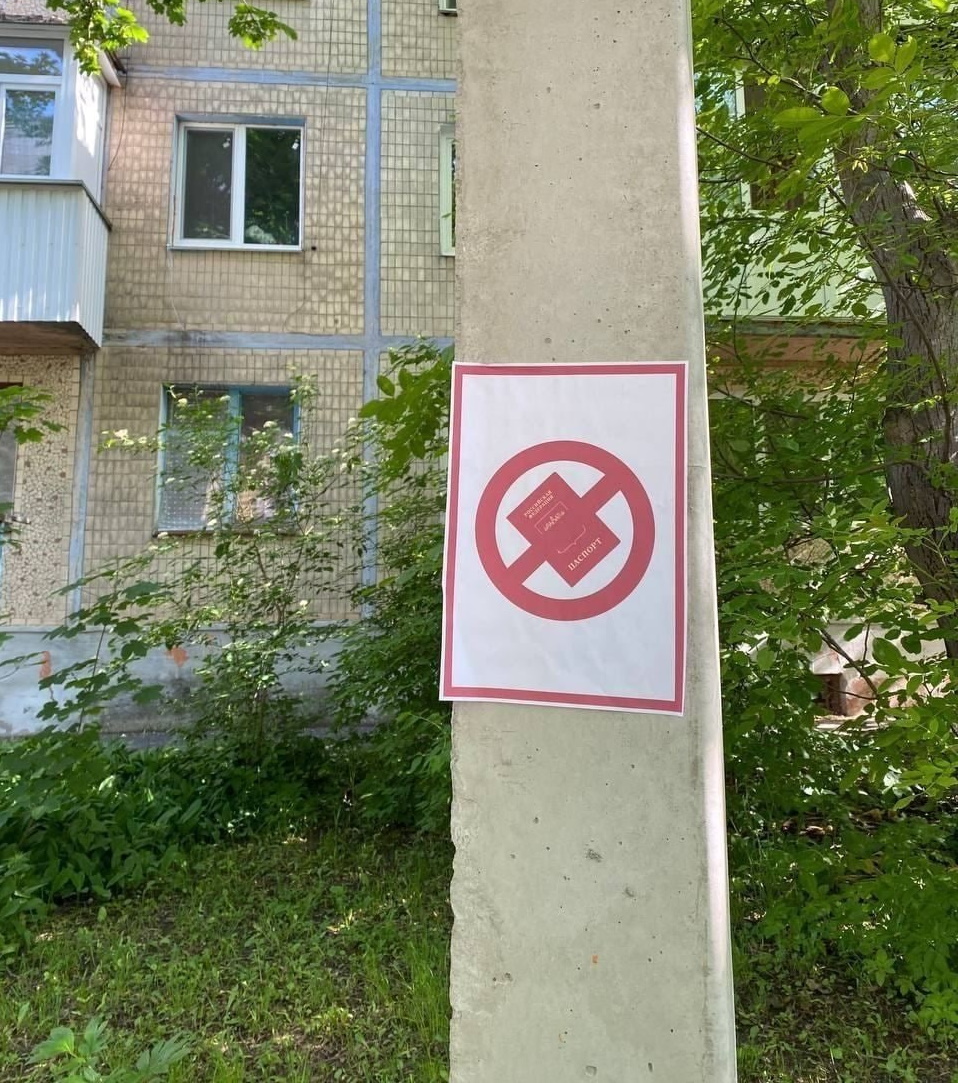
Kherson partisans promise to pay with bitcoins for the elimination of Russian soldiers or destroying their military equipment. To make the process of cleansing the area of invaders easier, they leave instructions on preparing Molotov cocktails or places of dislocation of Russian troops - checkpoints and bases.
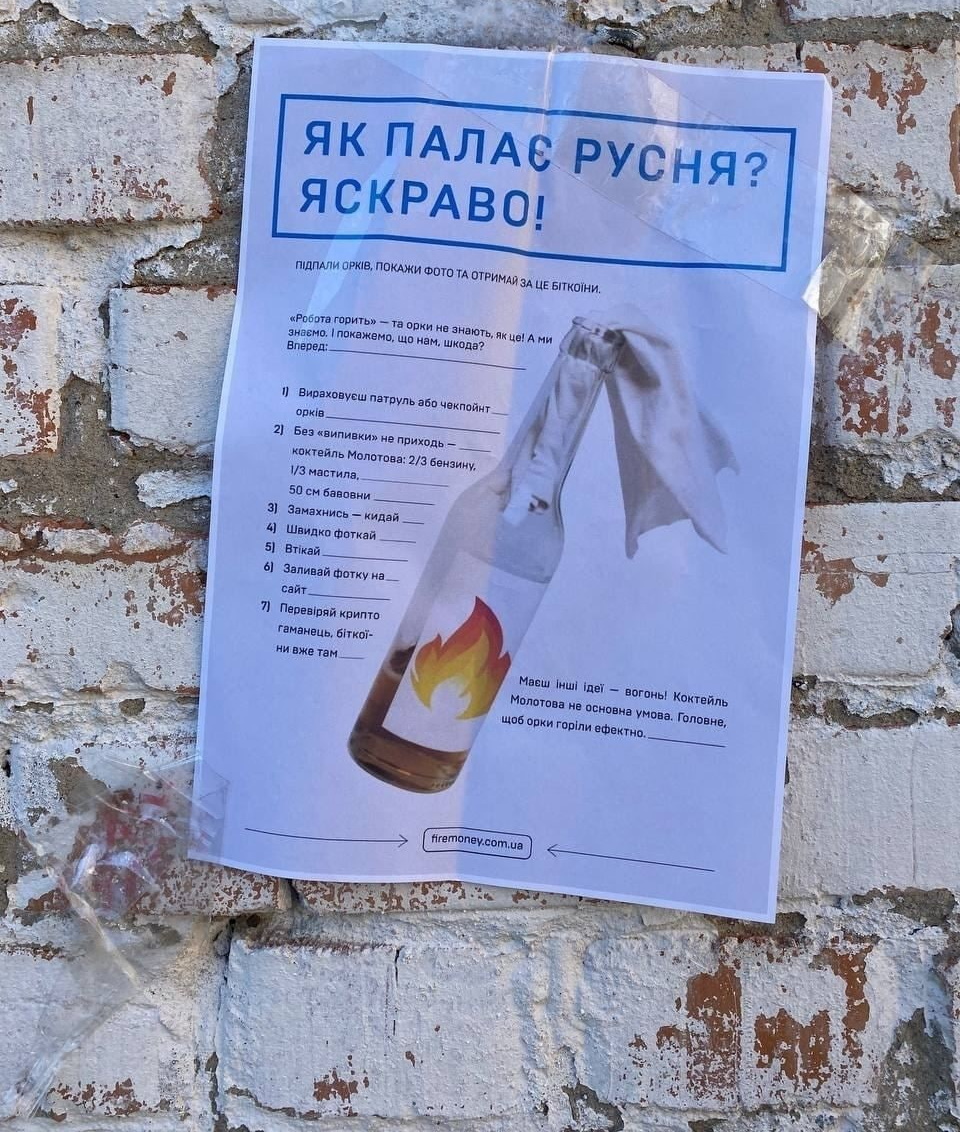
The Russians’ list of methods of convincing locals that Kherson has always belonged to Russia includes putting up flags of Russia on administration buildings. Nevertheless, in the morning, they usually discover a blue and yellow flag on the roofs - people are replacing Russia's flags with Ukrainian ones when the dark comes. Yet, occupiers can’t find people who do it despite all efforts to catch partisans.
In the first weeks of the invasion, locals fearlessly demonstrated Ukrainian flags in front of Russian infantry and armored vehicles.
Ukrainians suggested their vision of the future of Kherson by hanging effigies of Russian soldiers in a local park.
On June 14, journalist Andriy Tsaplienko released a video address of a Ukrainian soldier who said that Kherson would soon be liberated as the Ukrainian Armed Forces had reached positions 10 km from the city. Kherson partisans immediately spread the news over Kherson. "Rashists, are you ready to sing the anthem of Ukraine? Kherson, 10 km to freedom," members of the resistance movement asked Russian invaders in their leaflets.
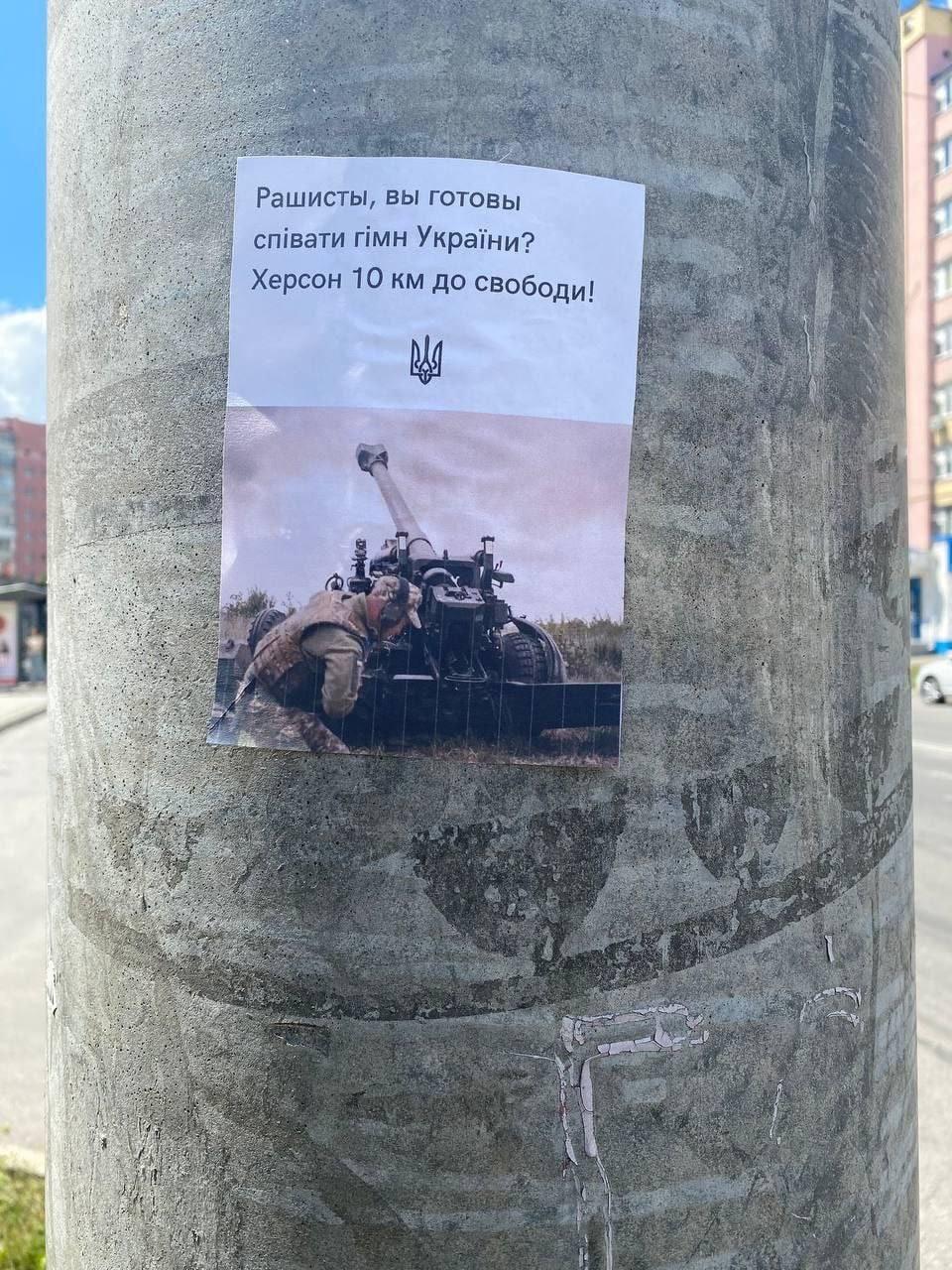
In recent days, the wrath of the partisans has fallen on local collaborators. A leaflet campaign warned them of their fate when the Ukrainian Army enters the city, but local activists are bringing retribution closer
For instance, car explosions are on the rise: one on 18 June was targeted at another collaborator - the head of a local prison colony. Russian troops labeled this incident as a “terrorist act” of Ukrainian partisans.
https://twitter.com/EuromaidanPress/status/1538125623670935552
And on 22 June, two more happened. One targeted the car of Yuriy Turuliov, former head of the local bus station in Chornobayivka whom the occupiers appointed as the local quisling mayor. The explosion was reported on by Russian media, but Turuliov was said to not be seriously injured.
Another car explosion claimed to take the life of Oleksiy Kovaliov, a Ukrainian MP collaborating with the Russian occupiers. Ukraine’s Intelligence Head Kyrylo Budanov confirmed that the car destroyed in the blast indeed belonged to Kovaliov, and whether he is alive is to be established.
He also noted that these and other “unusual” events in the Kherson region are the work of Ukrainian agents and partisans who collaborate “with all [Ukrainian] power structures.”
And on 24 June, an explosion attributed to partisans took its first known victim: Dmytro Savluchenko, a pro-Russian activist in Kherson who was appointed to head the Department of Youth and Sports at the Kherson occupation administration. Serhiy Khlan, an aide to the legitimate Kherson Oblast governor, reported on his death and stated that the Ukrainian Army coordinated the work of the partisans in this case.
https://twitter.com/EuromaidanPress/status/1540246218978332672
Corroborating information about the coordination of the partisans with Kyiv is a report in The New York Times citing a senior military official who said that Ukrainian partisans helped coordinate artillery attacks in the Russian-occupied part of Kherson Oblast, during which the Ukrainian Army then pulverized a Russian base with shells, killing roughly 200 Russian soldiers and two generals.
Driving up the ante is a recent cryptic report by Ukraine’s Operational Command South that two Russian special operations force soldiers were killed and one wounded were recently shot in one of the city's waterfront cafés, hinting that either Ukrainian special forces or partisans were behind the attack.
But local farmers don’t shy away from decisive actions, either: in early June, the local media Telegraf reported that local farmers of Kherson Oblast opened fire on Russian occupiers who intended to steal their combine, citing locals who asked not to be named. The farmers told Telegraf that the occupiers are threatening them with prison if they refuse to plant the new harvest.
“We don’t yet know how to be, we try to unite and wait for liberation. The larger [farmers] can at least have a dialogue, and small farmers in the villages suffer much more, they can just have their grain or vegetables taken from them without no questions asked,” said Telegraf’s interlocutor, an agricultural company owner.
How Russians crushed local resistance in Nova Kakhovka
Local resident Tetiana left the city with her friend because she was afraid her daughters might become victims of sexual abuse by Russian troops. She recalls the events of the first day when invaders occupied the city on February 24:
“At 4 am, I woke up to the sounds of explosions. I realized the missiles targeted a local military unit. I took my children, and we ran straight to the school’s bomb shelter. We stayed there for about a week and slept on chairs and desks. As far as I understand, they located Grad missile launchers next to the school. From there, they attacked Kherson and Beryslav. After the invasion, Russian forces immediately headed to Khakhovka Hydroelectric Power Plant and put a Russian flag on its building. Some villages next to the city were completely ruined. Nothing left. The soldiers broke into some settlements that remained undamaged. They kicked people out and stayed in their houses. Many residents left their places themselves because they were absolutely horrified.”
One-two weeks after the war began, the resistance movement started to form.
“I saw a post about a rally in the city. We left the children at home and went to the streets. Russian occupiers were, of course, shocked to see about 5,000 people with Ukrainian flags and wreaths singing Ukrainian songs. At the end of the peaceful rally, people began shouting at Russian soldiers. They opened fire in the air and threw tear gas grenades in the crowd,” Tetiana told.
Invaders, then, cut off communications so residents could not quickly gather anymore. However, she remembers several rallies in the next two weeks.
"They were afraid of people and went out only with guns and bulletproof vests."
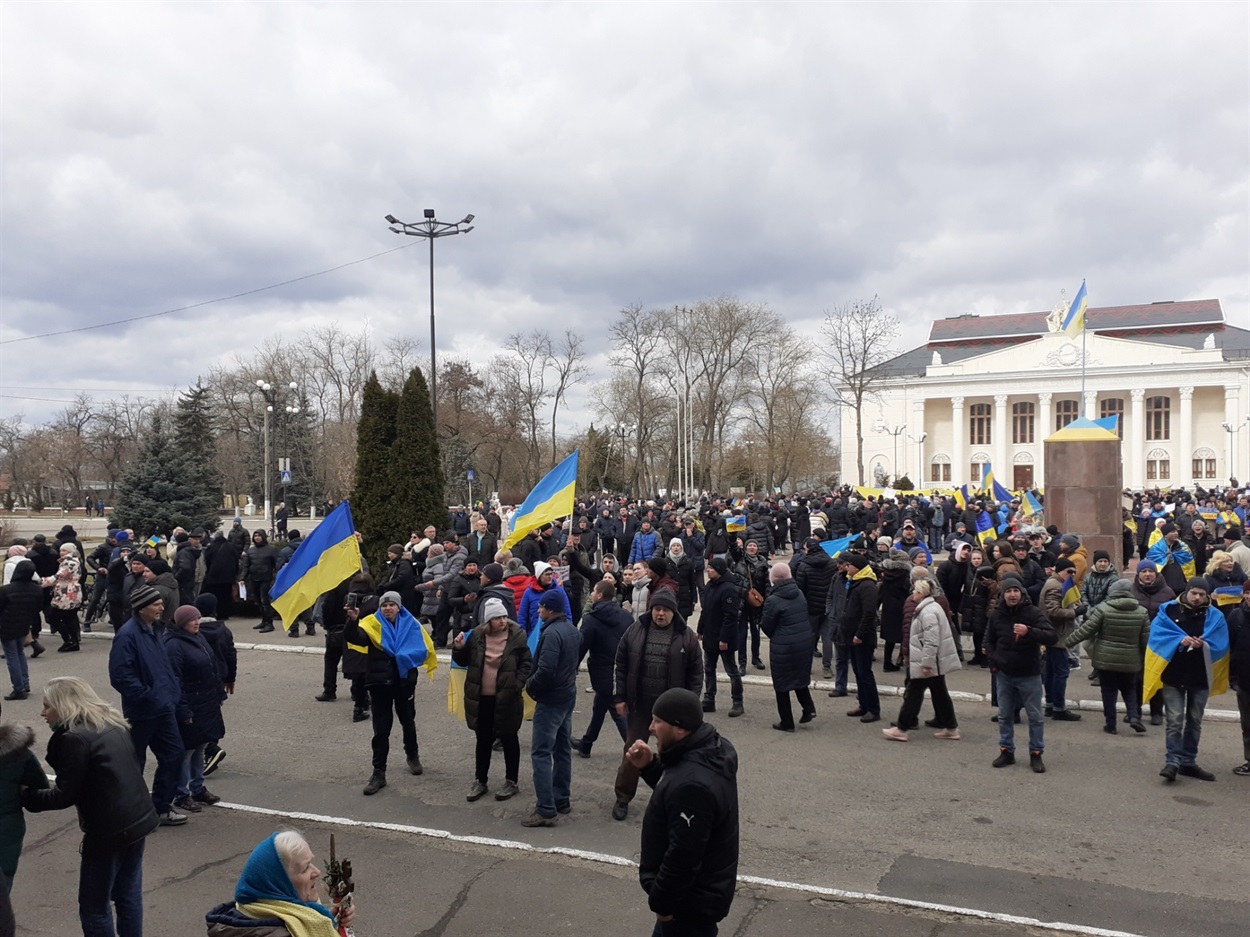
Resistance in smaller cities of Kherson Oblast
Henichesk was one of the most popular destinations for tourists in Ukraine before Russia’s so-called liberation had started. Now occupiers have turned the city into a poor and abandoned place. Recently the Security Service of Ukraine revealed that Russian authorities plan to take over local gas stations and sell fuel to Crimea. Also, they arranged an illegal census to collect data on residents and to find potential members of the resistance. They fooled locals by saying they would send personal details to the UN but faced challenges as people did not believe their words. An 18-year-old teenager who posted the news on the census and explained why people should avoid taking part in it was severely beaten by Russian soldiers.
“Skadovsk is Ukraine,” proudly said residents of another seaside city when they gathered in a rally on March 7.
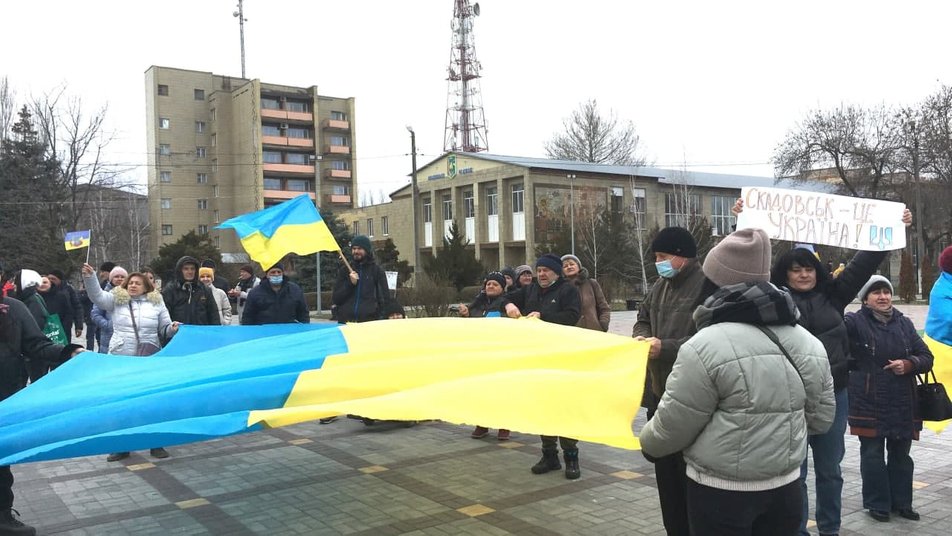
In social media groups, names, posts, images, and contacts of members of Russian administrations, collaborators, and soldiers have been spread since the start of the invasion. Local residents are furious about their actions and want them to be killed or jailed as soon as possible.
In response to the actions of partisans, Russian occupation authorities are threatening locals with a ban on the groups and harassment. "I'm preparing a letter to the Roskomnadzor and other institutions with a demand to block such resources. We will analyze comments and find the most active members," said Ihor Kastiukevich, the deputy of Russia's State Duma and coordinator of the pro-Russian party United Russia in Kherson Oblast.
Despite his statements, the officers who joined the police established by invaders are hiding their faces under masks, or blurred filters when taking part in propaganda news reports supposedly being afraid of the resistance movement.
Even children in Skadovsk are resisting Russian propaganda. Upon attempting to proselytize local kids into the Russian version of World War II, an occupier was rebuked with verses of the popular Ukrainian song “Batko nash Bandera,” which invokes the Kremlin-demonized leader of the Ukrainian Insurgent Army, a movement that during World War II fought against Soviet troops for Ukraine’s independence.
Russia’s plans for Kherson Oblast: a referendum, water to Crimea, and a food crisis
Russia plans to dominate southern Ukraine and establish a land bridge to Crimea, a peninsula that has always depended on the water supply from the mainland. Crimea received most of its water from the Ukraine Dnipro River via the North Crimean Canal. After its occupation, Ukrainian authorities cut off 90% of fresh water sources in the region.
When Russian troops invaded the Kherson Oblast, they took control of the Kakhovka Hydroelectric Station and directed water to Crimea. "The amount of damage for unauthorized use of Ukraine water resources is UAH 32.63 million (more than $1,102,295) per day. So, the thief has already stolen water for a total of almost UAH 620 million (almost $20,945,298)," the State Environmental Inspectorate of Ukraine said.
Furthermore, Kherson Oblast attracts the aggressor with almost 2 million hectares of agricultural land. And by establishing control over it, Russia might have the opportunity to block grain exports that will exacerbate the food crisis in the world.
War crimes
Stealing grain, raping women and children, looting shops, launching missiles, enforcing the use of the ruble - the list of war crimes expands each day.
Recently, Michael Carpenter, US Ambassador to the OSCE, expressed his confidence that Ukraine would liberate Kherson, that Russia has now turned into a "laboratory of horrors." The US will continue to support a sovereign, independent, democratic Ukraine and its territorial integrity, he added.
Today Russian troops commit mass sexual violence in the region. Former Verkhovna Rada Ombudswoman for Human Rights Lyudmila Denisova claimed that there were repeated cases of rape and sexual abuse against children in Oleksandrivka village with the youngest victim of only 6 months age. Overall, 52 children were killed in Kherson Oblast since the start of the war on February 24.
Members of Territorial Defense units and local authorities as well as pro-Ukrainian activists and former soldiers are being detained at checkpoints and right on the streets. Invaders hold at least 130 residents in captivity, according to the information from the Kherson Regional Prosecutor’s Office. On June 17, Bihus.info reported that Russian soldiers killed at least 25 men in one of the settlements of the Vysokopilska community. The men were shot and left outside a local house of the culture.
As Ukrainian forces are approaching Russia's military positions in Kherson Oblast, occupiers become crueler and more violent in their actions against locals. "Russian troops carry out raids on Ukrainians to track and find people who are willing to resist," said the first deputy chairman of the Kherson regional council Yuriy Sobolevskyi.
Ukrainian counteroffensive
In recent weeks, reports about a Ukrainian counteroffensive in Kherson Oblast have been spreading.
Natalia Humeniuk, the spokeswoman of Ukraine’s Operational Command South, announced that the Ukrainian forces had successes, but the exact settlements where these successes were will not be announced until Ukraine has them under its steady control.
The successes were also reported on by Serhiy Khlan, an aide to the Kherson military governor. He said that Ukrainian forces had forced the Russians to retreat from the first line of defense.
However, military analyst Roman Ponomarenko is not sure about Ukraine’s successes, assessing the counteroffensive as “stalled” due to insufficient resources involved in the operation.
In any case, advancing on the Kherson Oblast is a priority for Ukraine’s leadership. Recently, President Zelenskyy stated that liberating occupied Kherson is a key goal for the Army in the south. And Ukrainian officials are urging residents of the oblast to evacuate because of impending battles, even via occupied Crimea.
Natalia Humeniuk noted that she is constantly in contact with residents of the occupied territories and partisans who help the Army.
"We have contact with them, we communicate with them, we support them and we are very grateful for the powerful partisan movement with which they keep the occupiers on their toes. Because they constantly show that Kherson, Kherson Oblast is Ukraine and liberation is near," Humeniuk stressed.
Related:
- Russia staged missile attack on occupied Kherson to blame Ukraine, OSINT suggests
- Russian war crimes: “denazifying” Ukrainians through deportation, torture, detention and filtration camps
- Russian plans for Ukraine’s south: “South Rus,” “Kherson People’s Republic,” annexation
- The Kherson “referendum” sham: out of the Kremlin’s hybrid war playbook

